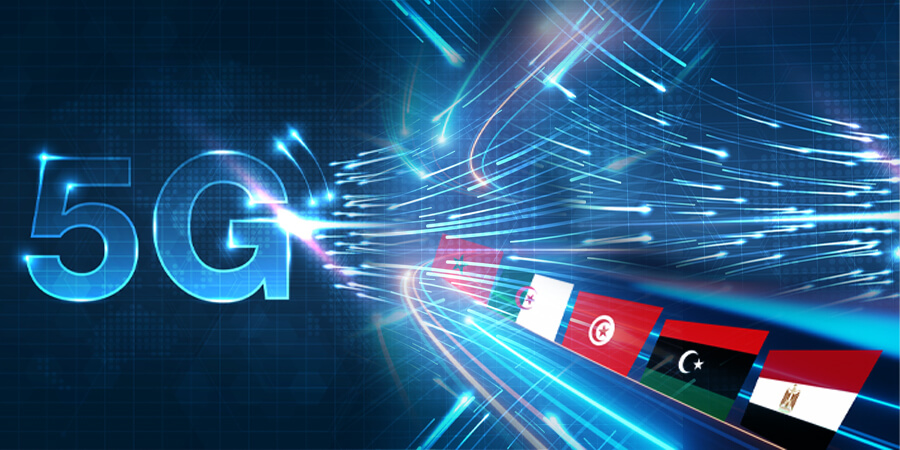The adoption of 5G technology in Africa is surging significantly, with a 47-fold increase in subscriptions projected over the next five years. Excluding North Africa, this forecast paints a dynamic picture of the continent's digital transformation. According to the Ericsson Mobility Report for 2023, 5G subscriptions are anticipated to jump from 3 million in December of the previous year to an estimated 140 million by 2028. This remarkable growth, while demonstrating Africa's technological leap forward, conceals a relevant detail: the pace of 5G deployment in North Africa has lagged behind, presenting a unique set of challenges and opportunities in the region's pursuit of cutting-edge connectivity.
Is North Africa Ready for 5G?
When considering North Africa in conjunction with the Middle East, the region is anticipated to reach 290 million 5G subscriptions, comprising 32% of the total mobile subscriptions in that area. Notably, a substantial portion of these subscriptions will come from countries like Egypt, Morocco, Algeria and Tunisia, which boast well-established middle-class markets.
Taking into account the North African figures along with the projections for sub-Saharan Africa, the total number of 5G subscriptions across the continent is expected to surpass 120 million. The boost in 5G investment in Africa is attributed to factors such as a sizable young population and a high demand for connectivity. Meanwhile, countries like South Africa, Kenya and Nigeria were early adopters of 5G, and now more than ten nations in Africa are intensifying their efforts to deploy high-speed networks.
Exploring this topic, Telecom Review recently held a webinar entitled "5G Deployment in North Africa," bringing together industry experts to discuss key points, including adoption rates, coverage potential and spectrum-related opportunities, as well as some challenges in the region. Issam Eid, COO of Telecom Review Africa, moderated the panel, which featured speakers from GSMA Intelligence, Orange Egypt, Ericsson and Nokia, offering valuable insights. North Africa, while showing readiness for 5G, lags in commercialization and spectrum allocation. The discussion highlighted ongoing testing and trials for 5G, with Egypt gaining regulatory clearance. The importance of proper frequency allocation and 5G's impact on GDP growth were also discussed, along with the potential for 5G fixed wireless access to bridge the digital divide. Energy efficiency and spectrum allocation strategies for optimal 5G deployment were addressed, emphasizing the need for careful planning and monetization. Allocating sufficient bandwidth and adopting a gradual approach were recommended for a successful 5G experience.
GSMA reports offer comprehensive insights and data on the progress of 5G implementation in North Africa. Globally, as of June 2023, 238 operators in 94 markets had initiated 5G operations. Another 106 of them in 52 markets also introduced fixed wireless access connections. Notably, 254 operators in 110 markets conducted 750 trials on 5G, with major players like Nokia and Ericsson playing a significant role. The GSMA emphasized the crucial role of the mid-band frequency range (1-7 GHz) in driving global 5G deployments. However, North Africa was observed to lag behind in 5G commercialization and spectrum allocation compared to other regions on the continent. Nevertheless, North Africa exhibited readiness for 5G, with high levels of smartphone and 4G adoption, along with substantial investments by operators in network modernization. The GSMA report emphasized the urgent need for spectrum allocation in North Africa and the projected availability of commercial 5G services by 2024, which could result in over 130 million 5G connections in the region by 2030. This would be equivalent to 41% of total mobile connections in North Africa. Further, the adoption of 5G could contribute $6.6 billion to the North African economy by 2030.
Switching to 5G
To effectively adopt 5G, a country should consider the following steps:
- Formulate a comprehensive national strategy.
- Foster a conducive regulatory environment.
- Allocate suitable frequency bands.
- Encourage private sector investment.
- Facilitate public-private partnerships.
- Streamline approval processes for infrastructure deployment.
- Address security concerns through stringent standards and protocols.
- Promote local R&D and skills development, ensuring inclusivity and accessibility across urban and rural areas.
- Encourage an ecosystem of innovative 5G applications and educate the public on their benefits and safety.
- Monitor progress through defined KPIs.
- Collaborate internationally and remain adaptable to evolving technologies and opportunities.
Still, it's worth noting that significant challenges remain for 5G deployment in North Africa, including the relatively high cost of 5G-compatible devices, low levels of digital literacy and uneven network coverage, particularly in rural and remote areas. Migration to 4G networks continues to be prominent, replacing the prevalent 2G technology, especially in rural regions.
The GSMA has emphasized the crucial role of spectrum assignments in driving robust 5G growth in North Africa. Governments in the region are striving to meet industry targets for mid-band spectrum allocation for 5G. The report provides guidance on how governments and regulators can facilitate the efficient availability of spectrum for 5G development. Countries including Algeria, Egypt, Morocco and Tunisia have begun identifying suitable 5G spectrum for launching services soon.
Exploring Key Elements
The report contains crucial insights on optimizing investments and enhancing user experiences in 5G deployment. Some experts suggest the pivotal role of meticulous planning for efficiency and success, with many operators favoring non-standalone (NSA) deployment initially due to its strategic advantages.
This approach highlights the popularity of NSA deployment for its network simplicity and potential for maximizing 5G capabilities through experimentation, noting that investments in NSA are fully compatible with future standalone 5G deployments and ensure a seamless transition. Furthermore, the growing awareness of 5G among consumers was distinguished, with the prediction that this heightened awareness will spur interest and adoption.
Importantly, it emphasizes that consumers may not experience significant price increases during the transition to 5G, an appealing proposition. The report notes the critical importance of monetization in the 5G landscape, a pressing concern for many operators. These insights provide invaluable guidance for vendors and operators navigating the complexities of 5G deployment while effectively monetizing investments and delivering exceptional user experiences.
In anticipation of the growing 5G adoption in North Africa, it is crucial to integrate sustainable practices into the deployment process. This entails advocating for the use of energy-efficient infrastructure, embracing renewable energy sources and implementing robust e-waste management policies. Additionally, efforts should be directed towards reducing the carbon footprint associated with 5G operations through innovative technologies and optimized network architecture. Collaboration between stakeholders, including operators, technology providers and environmental organizations, can further drive sustainable initiatives. Public awareness campaigns and regulatory support are essential components, ensuring that 5G deployment in North Africa not only advances connectivity but also contributes positively to environmental goals, aligning with global efforts for a greener future.
In the pursuit of 5G deployment in North Africa, it is imperative to prioritize digital inclusion to bridge the technological divide. This involves targeted initiatives to ensure that underserved communities, particularly in rural and remote areas, have equitable access to 5G technology. Implementing affordable data plans, providing subsidies for 5G-compatible devices and establishing community access points can significantly enhance accessibility. Investing in digital literacy programs and skill-building workshops will empower individuals with the knowledge and capabilities to fully leverage the potential of 5G. By prioritizing digital inclusion, North Africa can harness the transformative power of 5G to uplift communities, stimulate economic growth and foster a more inclusive and connected society.







